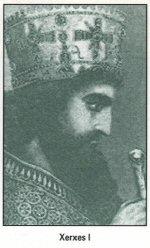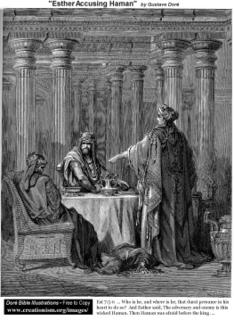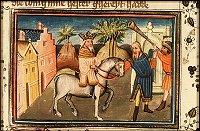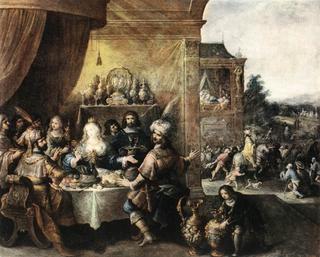Esther - The Exile On Main Street
Adam and Eve were cast out of the Garden of Eden into a fallen world. From their descendants would come the heroes and the villains whose acts define history.
The adventures of Esther take place at the epicentre of this world, in the palace of the ruler of an empire which stretched from India to Ethiopia.
It’s often said that Esther is a book where God does not feature as a personality, explicitly intervening in events. But the author seems determined to reveal the folly and idiocy which springs up when human beings act as if they were deities with power over life and death.
The ambition of humans to exalt themselves to a position where they can claim to be “like gods” started in Eden, resulted in the Fall, and led to the Tower of Babel building project.
The king in this story, Xerxes I, was a man too proud for Babel. The kingdom of Babel was part of his empire but he erased it from the map. Traditionally, the ruler of Babel would turn up on New Year’s Day and seize the hands of the golden statue of Bel. Xerxes had the statue shipped off and killed the priest who got in his path.

The narrator of the book of Esther takes us through the gates of this ruler of the Persian empire. Here, we should find unsurpassed wealth and grandeur, and glory, but the empire has gone stagnant. The story is scattered with so-called noblemen but there is scant nobility in its 10 chapters. We see Haman, perhaps the most dastardly henchman in the bible, manipulating Xerxes to order the annihilation of the Jewish people.
Persia has become a repository of indulgence, plots and genocide. If the creation of the empire can be seen as a wonder of ancient civilisation, its corruption testifies to how easily humans of every era get drunk on our pride, hatred and greed.
Haman in effect arranges for a Holocaust. He persuades Xerxes to sanction a decree which would allow anyone to kill a Jewish man, woman or child and plunder their goods. What persuades him to carry out this filthy plan? His hatred of the Jews is sparked by the refusal of Mordecai, a civil servant, to bow before him like the rest of the king’s officials.
There are echoes here of Shadrach, Meshach and Abednego refusing to bow before the image Nebuchadnezzar set up, but Mordecai may not have been resisting idolatry. Instead, he may have simply been repulsed by the idea of prostrating himself before a descendent Agag, king of the loathed Amalekites.
It’s easy to portray Mordecai and Esther as superheroes, the Clark Kent and Lois Lane of fifth century Mesopotamia. If we look closer, we see they are not painted in the primary colour simplicity of a comic strip but are complex individuals at the heart of a regime on the verge of relegation.
Xerxes’s grandfather was Cyrus the Great, who allowed the exiled Jews to return to Jerusalem and start rebuilding a Temple to the glory of God. For reasons which aren’t clear, Mordecai and Esther have stayed in the tempestuous metropolis of Susa.

It’s reasonable to think that Xerxes wakes each morning with a hangover. The book is awash with references to his drinking. Moments after sanctioning the killing of all Jews, we are told, “The king and Haman sat down to drink, but the city of Susa was bewildered.”
His career had started promisingly, when he successfully subjugated Egypt. He had almost done the same to the Greeks in 480BC when a disastrous decision to attack their fleet in dodgy conditions resulted in the humiliation of the Battle of Salamis. This event signalled the start of a Greek golden age and Xerxes’s descent into the Not Terribly Good Club of despots.
He made a stab at circumnavigating Africa but Herodotus tells us that Xerxes retreated into his harem where it seems he would spend most of his remaining days until he was murdered in 465BC by an ambitious courtier.
Like a rock star whose third album isn’t selling very well, we see him in Chapter One trying too dissolve his sorrows by throwing a three-day garden party. Every man was given a goblet of gold which was kept filled with the drink of his choice.
At the end of this session he remembered he was married to Queen Vashti, a wife of profound beauty. He told his eunuchs to tell her to put on her crown and come before this heaving throng so they could feast their bleary eyes on her delights.
It’s not surprising that she said, “No.” And it’s a sign of how far the empire had fallen how fast that the courtiers who had been on the verge of subduing the home of Homer began worrying that this act of disobedience would result in any wife throughout the realm ignoring her husband’s wishes. They issued an edict to every people in every language “every man should be the ruler of his own household.”
When the mighty infrastructure of Persia is being wasted on such daft exercises it’s simple to see how easy it could be for a schemer like Haman to work to use its apparatuses for evil. But it is the Queen Vashti fiasco of this less than glorious moment of history that led to Esther becoming Queen. Like Daniel and Joseph before her, she was a Jew who had risen to the pinnacle of an empire.
But unlike those two stalwarts of Sunday School tales, there is no evidence that she - or Mordecai for that matter - was proudly and publicly Jewish. Instead, Mordecai ordered Esther not to tell anyone of her heritage. They are two people who are prospering in the midst of paganism, neither of them seeking to ruffle any Persian feathers.
One of the compliments you sometimes hear being paid is, “He [or she] is great. They go to church but they don’t wear their religion on their sleeve.”
We live in a society which tolerates religion when it is a private and personal thing. When it starts influencing the decisions you make which affect other people’s lives, that’s when it becomes a problem.
Mordecai and Esther had done an exemplary job of being dutiful and diligent in a multicultural society. The two had even saved Xerxes’s life when Mordecai uncovered a plot by a pair of guards to kill the king and told Esther to warn him.
The book of Esther is a story of when the religious identity and truth two people carried within them exploded into the public sphere with incredible results. Esther’s decision to risk death by striding into the presence of Xerxes and pleading for the lives of her people prevented the annihilation of the Jews.
Just as Xerxes and Haman were living as if there was no God to whom they would one day have to give an account, it is the experience of Christians and Jews today that they feel they have to hide the fact that they have glimpsed the revelation of the Creator of the world. Like Lottery winners who ticked the “no publicity” box and hope their friends and relatives will not notice their secret wealth we are compelled to skulk around. Yes, we know the name of the person who designed Andromeda and placed her in the sky, and we can actually talk to Him, but we can’t talk about Him.

Such silence was the price of a pleasant professional life in Susa, too. But Haman’s heinous plan to rid the world of Jews resulted in His chosen people stepping out of the shadows.
We learn: “In ever province to which the edict and order of the king came, there was great mourning among the Jews, with fasting, weeping and wailing. Many lay in sackcloth and ashes.”
Mordecai, who previously advised Esther to hide her identity, now told her to enter the presence of the king and beg for mercy for her people.

However, Xerxes was not what you might call an easily approachable sort of guy. Anyone who entered his court without being summoned was punished with death. Only if he raised his sceptre at you would your life be spared.
The evidence is that Mordecai loved Esther. She had been an orphan and he raised her as his own daughter. Esther grew up to become one of the most beautiful women in the empire and been taken into the royal household as part of a search for a replacement for Queen Vashti. Every day during this time Mordecai walked to and fro outside the courtyard of the harem to find out how she was and what was happening.
Now he was urging her to (a) risk sudden death by walking into Xerxes’s court uninvited and (b) identify herself as part of a people group singled out for extermination.

The warning he gives her is fascinating. He does not tell her that the survival and destiny of the Jewish people are in her hands - only Yahweh can be said to have such power.
Instead, he says, “Do not think because you are in the king’s house you alone of all the Jews will escape. For if you remain silent at this time, relief and deliverance for the Jews will arise from another place, but you and your father’s family will perish. And who knows but that you have come to royal position for such a time as this?”
Esther’s response is to tell her cousin to gather together all the Jews in the great city of Susa and have them fast for her for three days. The crisis has forced them into prayer, into crying out to the creator and calling for His power.
It’s in these moments that the universe can be glimpsed with a new clarity. In acknowledging the might of God, it becomes clear that while Haman and Xerxes are cruel imbeciles they are in reality nothing more than heaps of carbon. They have the capacity to cause terrible hurt and hardship but there is a deeper reality behind the universe which they cannot even scratch.
Esther, perhaps the most beautiful hero to ever walk this Earth, sets off for the king’s courtroom with the words “If I perish, I perish.”
History is filled with martyrs who have perished. The graves of the first disciples are not those of men who died peaceful deaths. But in this case, Xerxes lifts his sceptre. A couple of banquet’s later, Haman is unmasked as a would-be Queen-killer. Xerxes orders Haman to be hanged from the same 75ft gallows he had built in his garden and from which he wanted to see Mordecai swing.

Mordecai is given control of Haman’s estate and entrusted with the king’s signet ring, and the Jews are given the freedom to protect themselves by attacking the mobs who had been planning to slaughter them. A few days later, 75,000 of their enemies are dead and a new festival has been instituted to commemorate the incredible deliverance of the Jewish nation from annihilation.

The festival of Purim is still celebrated to this day, and though the Persian empire has completely collapsed, if you are ever in the Iranian city of Hamadan you can visit the Shrine of Esther and Mordecai.

It is the definition of an unforgettable story. The Jews of Susa put on sackcloth and cried out to God in the face of an incredible injustice and a orphan girl from the tribe of Benjamin was able to change the heart of a despot. The Bible is full of such tales. The prophet Jonah proclaimed God’s message to the people of Ninevah and they put on sackcloth and repented.
We live in the same fallen world as Mordecai and Esther but at a time when we are surrounded by injustice and idolatry. The Economist/prophet Jeffrey Sachs who provided the cerebral muscle behind the Make Poverty History movement, writes, “Currently, more than eight million people around the world die each year because they are too poor to stay alive.”
Those of us fortunate enough to live in the European Union or North America are citizens of the equivalent of the Persian Empire. The US can afford to spend $450bn on the military this year and still find the money to subsidise cows.
The prospect of the deaths of thousands of his people prompted Mordecai to lie in the streets of Susa. Is our response to change the channel?
This empire of affluence which exists on both sides of the Atlantic is now packed with Christians and governed by democracy, which theoretically means the ultimate arbiter of what happens is not the will of a despot but the will of the people. The book of Esther is clear that human beings aren’t really in control of very much and that God is sovereign, but perhaps we should follow her example and venture into the corridors of power a little more often. In our public worship, can we find time for repenting and lamenting?
But first, let us pray that we will be able to live believing that God is so passionately aware of what happens in his world that he knows when the heart of a sparrow skips a beat. Let us not hide the wonders of his love and the liberating truth of his revelation which offers deliverance from sin. Yes, the world is fallen, but redemption is at work.


1 Comments:
Great site lots of usefull infomation here.
»
Post a Comment
<< Home